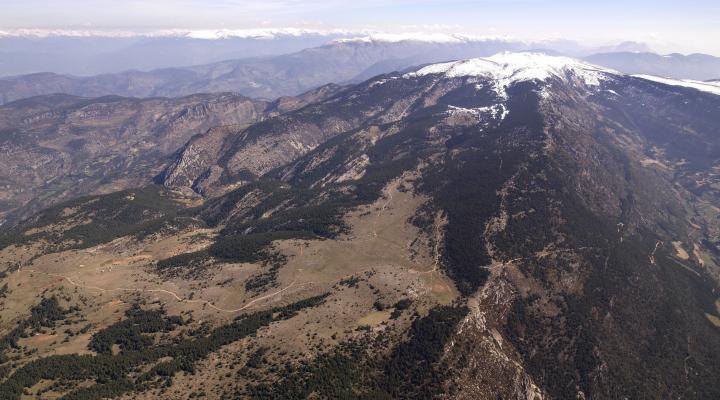
The Catalunya La Pedrera Foundation launches a new project to transform the Pyrenees through the bioeconomy
The Catalunya La Pedrera Foundation, together with five other organisations, is launching Bio For Piri, a forest bioeconomy project in the Pyrenees that recently got under way. Over the next two years, it will implement a series of actions aimed at reducing the risk of large-scale forest fires in two pre-Pyrenean regions: Alinyà, in Lleida, and Aínsa-Sobrarbe, in Huesca. The project’s mission is to promote the forest bioeconomy through woodland management as a solution to two of the region’s major challenges: forest fires and demographic decline.
A transformative initiative backed by nearly 2 million euros in investment
The Biodiversity Foundation, under the call for proposals for “Ecosystem and Biodiversity Conservation and Restoration” as part of the Recovery, Transformation and Resilience Plan (RTRP) funded by the European Union’s NextGenerationEU programme, has allocated €77 million to be distributed among 56 selected projects across Spain.
Bio For Piri ranked second among all submitted proposals and received a total of €1,992,473.22. These figures highlight the project’s strong transformative potential to promote a forest-based bioeconomy and contribute to the ecological transition.
One of the most sensitive and vulnerable areas to fire risk on the Iberian Peninsula
The Pre-Pyrenees are an area of outstanding natural beauty, with a varied landscape of gentle hills, fertile valleys, winding rivers and dense forests. This region, which forms a transition zone between the plains and the mountains, is home to a rich diversity of flora and fauna, as well as rural villages and communities that rely on farming, livestock and tourism. Its forests, in addition to being one of the area’s key economic assets, represent a valuable natural heritage of major ecological importance for conservation at European level.
In recent years, the abandonment and precariousness of the primary sector has led to the loss of the agroforestry mosaic. Coupled with the current climate context, this has significantly increased the risk of large-scale forest fires in the Pyrenees. Given the scale and potential impact of such a fire – which could burn continuously from Navarre to Girona – this is considered one of the most sensitive and vulnerable areas to this threat on the Iberian Peninsula.
Six leading organisations join forces to turn the threat of forest fires into an opportunity
The Bio For Piri project is implementing a series of actions to reduce the threat of large-scale forest fires in the Pyrenees, while at the same time transforming these prevention and forest management efforts into opportunities for rural development and the conservation of natural heritage through the forest bioeconomy. The project focuses on three main areas of work:
- Forest fire prevention and woodland management
- Promotion of the forest bioeconomy
- Knowledge transfer
The project is the result of collaboration between six leading organisations in their respective fields. Leading the initiative is the Catalunya La Pedrera Foundation as coordinating entity, working alongside five partner organisations: the Forest Science and Technology Centre of Catalonia (CTFC); the Foundation for the Conservation of the Bearded Vulture; the Empresa & Clima Foundation; the Pau Costa Foundation; and the Integra Pirineus Foundation.
Impact on two scales with triple effect: social, economic and environmental
The project’s actions will generate results on both regional and local scales. At the regional level, plans and criteria will be developed for preventing large-scale forest fires, applicable across the Pyrenean region (massif scale). At the local level – in Alinyà, Aínsa-Sobrarbe and their surrounding areas – residents will benefit from the implementation of measures with a direct impact on their area, ranging from job creation to the conservation of local biodiversity.